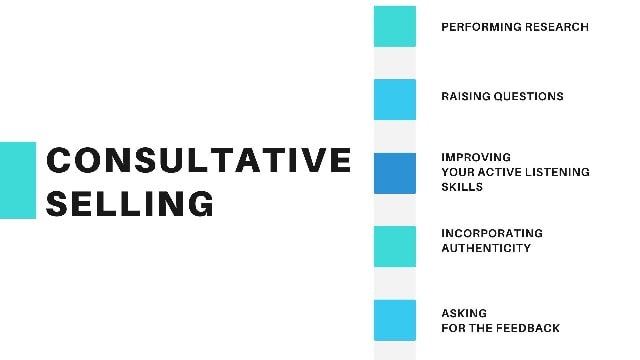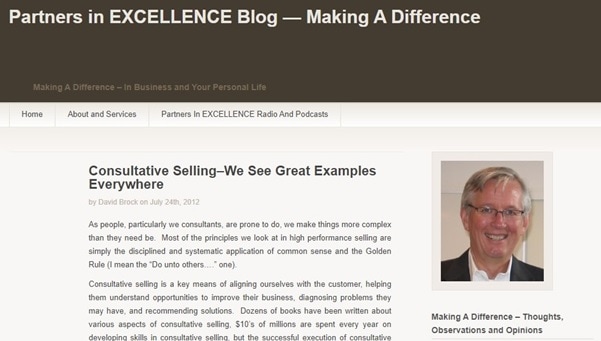When salespeople opt for an investigative approach by asking questions to get quality responses from the prospects to find out their pain points so that they can offer best-suited solutions to the potential consumers, then it is termed as consultative selling.
In this approach, salespeople or businesses are not suggested to boast about themselves or tell potential customers what they need, but it would be more useful to gauge consumers’ needs and then educate them so that they can make more informed buying decisions.
All in all, consultative selling helps businesses in offering more personalized services to consumers by solving the right problem for the right consumers.
In this post, we will dive deep into the world of consultative selling and understand how you can use it for offering customized services to your existing as well as potential customers. So, let us get started right away-
Table of Contents
Introduction to the Consultative Selling
Today, the competition is at its peak; companies are facing the consequences of poor business planning, businesses are in loss and on the verge of claiming bankruptcy.
At this point, selling products in the market is crucial.
It requires a lot of strategic planning. It must be adequately done by keeping in mind all the aspects.
Consultative selling helps you do this by developing a more productive and constructive relationship with the consumers. In this, relationship development comes on priority, and once the required engagement gets established with consumers, selling strategies come into play.
Thus, consulting becomes essential to help boost the sales of the company and maintain its value in the market.
Definition of Consultative Selling
Consultative selling is a process of building a relationship between a company (you) and its clients (prospects) from a philosophical point of view. It is believed that a salesperson who practices consultative selling in all possible ways, he or she then does an excellent job of making the prospects realize their pain points.
Practicing helps in gaining adequate knowledge about the buyer’s needs and develops a nuanced understanding of the same. Subsequently, it becomes easier to fulfill these needs with a standardized solution.
Consultative selling majorly means focusing on the customer, their wishes and their most significant fear factors before getting into trying to sell a product or service.
To understand the consultative selling approach better, you need to know how it is different from the product based selling approach-
Consultative Selling vs Product-based selling
In consultative selling, customer and their needs are the utmost priority.
In contrast, product-based selling, commonly known as transactional selling, has the product as the priority and not the customer. In this method, salespersons focus on a product’s features and benefits that result in neglecting customer’s needs.
So, consultative selling is more beneficial as its key feature is to build relationships with customers that are meaningful and lasting at the same time. It helps a company sustain itself in the competitive sales industry; as, without particular relations, there is always a risk of losing clients.
Let us now have a closer look at the differences between both of these methods-
- As discussed above, product-based selling emphasizes the features of the product, while consultative selling emphasizes on the customer’s needs.
- Apart from this difference, there are several other factors as well, that distinguish transactional selling from consultative selling. These are;
- Price and availability of products remain the key aspects of product-based selling; however, the price is of lesser importance than the value in the consultative selling.
- Value is the customer determines defined product in the product-based selling and value in consultative selling.
- A salesperson needs to put in a lot of hard labor in product-based selling while working smartly is the approach of salespersons in consultative selling.
All these pointers create a visible difference between the two forms of selling and affect the growth and status of the company in the market significantly.
Now, the time has come to go through different consultative selling techniques, so let us go through those as well-
Consultative Selling Techniques
1) Performing Research
Research plays an important role when trying to sell a product or service. A few parameters must be looked upon while researching-
- Knowledge about the customer’s interests is essential. It helps in aligning the client’s needs and products feature to get the best possible outcome.
- Consultative selling demands interaction with prospects and not just selling products. So, the more a salesperson knows about the client, the easier the conversation becomes.
- Next, proper and full-fledged research about the products is necessary to prove it to the clients why they need these products based on data and statistics.
- They are having a close look at all the products a client must be considering.
2) Raising Questions
Working upon a set of generic questions to start a conversation is required.
The choice of questions must be made carefully keeping in mind that a client is subjected to answer only those questions that they find appropriate.
Raising the right kind of questions helps clients realize their pain points.
3) Improving your active Listening Skills
A lot of people are good at “passive” listening that is they hear everything but do not register or interpret it, but very few people are good at “active” listening skills.
The salesperson needs to pay attention to every word a prospect says and more importantly understand its meaning.
It happens effectively only if the salesperson listens more and speaks less. Never interrupt. One must wait until the client finishes talking. Meanwhile, register everything said and then respond relevantly.
4) Incorporating Authenticity
A company fails to sell its products and services if it does not establish trust and is not authentic.
To build trust, being honest and sincere with the clients is very important. A salesperson should never guarantee anything that the company might fail to satisfy.
It is unethical to brag about the company’s value.
5) Asking for the Feedback
Through the entire sales process, one must keep a check on whether the client understands the view and ideas or not.
Constant feedback helps in better understanding and eases communication.
6) Following Up
Not all sales do well; there are very few sales that are closed based on the initial conversation. The whole procedure takes time to conclude, and one must be patient throughout the process, even if it takes a lot more time than estimated.
There might be a lot of oscillations in terms of the decisions of the client, and a salesperson should stay updated with the current client’s behavior regularly.
Stats show that there are five pointers in total that help close a deal, and this may vary depending upon the prospect’s needs and salesperson’s skills.
7) Connecting with the existing and potential consumers
Building a relationship with the prospect and connecting over social media is quite beneficial in several aspects. Social media creates content for a defined target and helps interact way before then a real meeting.
One can use LinkedIn, Twitter, Facebook or even Instagram to build their profile and target the exact market they need based on the type of products and establish a relationship. It accelerates the entire foundation building process between the company and the client.
Following all these techniques will help one to reach the goals and fulfill the demands of a prospect systematically.
Example of Consultative Selling
An example is always a good idea to understand the dynamics of a concept and its implementation in the real world where the actual problems are to be faced and not only from a theoretical view.
Consultative selling is not a technique that is only practiced and taught by salespeople but also by people who genuinely feel like helping customers for their good in the best way they can.
Many of them aren’t even aware of it and are just helping unintentionally like in David Brock’s example.
In this, David and his wife went for the usual grocery shopping.
They went down to the fresh meat counter to buy some good pieces to cook; the butcher took time out to help the Brocks and starting asking questions like what it is to be used for so that he could recommend the best cuts.
He gave the needs of the customer utmost importance and based on his knowledge and evaluation, provided the best results.
Another example is that of an Apple Store. The staffs at the store have excellent knowledge about their products and help customers choose products as per their needs and requirements to give them the best experience.
Key Points to remember about Consultative Selling
By now, it is clear that consultative selling is mainly about understanding the prospect’s crucial points and directing them towards the right path by giving them apt advice and providing the right solution.
If everything is done skillfully and with knowledge about the needs of the buyer as well as product or service that is to be sold, a salesperson can quickly gain the trust of the prospect through consultative selling and help in expanding the business taking it to new heights.
One key element to take care of is that the client must feel special, think they are in-charge and that everything is set as per their demands and preferences.
The following parameters if added to the process of consultative selling and if implied correctly, will contribute to growing the business and keeping the client satisfied much-
- A salesperson must concentrate on framing decent questions as well as develop the habit of asking better questions
- Gaining knowledge about the buyer’s demands, needs, and preferences
- Adding variety to the sales process, as it gives the buyer the liberty to choose as per their requirements from the wide range provided and also makes every element unique
- Training of the assigned team is crucial. Each member of the team must be trained on conversational parameters and should be well qualified on the same subject
With all these points, one can be sure of closing a client efficiently and quickly. These are the significant aspects if went wrong, can demolish the relationship and hence, the deal.
Consultative Selling Wrap Up!
Consultative selling is more like a therapeutic process where the salespersons are required to help prospects by making them understand their pain points and help solve them.
They need to carefully examine the buyer’s needs and generate appropriate solutions to tackle the problems faced. One of the main tasks is to align the interest of buyers and the features of the products and services they offer. It is a critical step in the whole process of closing a deal.
Hence, consultative selling is not only favorable to the clients as their interests are preserved, but even the company as their position positively evolves in the market and facilitates its growth in the sales industry.
Do you also find consultative selling more effective in converting more customers and boosting sales? Tell us about your views in the comments.
Also, share your experiences about how consultative selling helped you in making a productive relationship.
Liked this post? Check out the complete series on Sales


